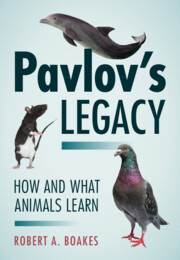Book contents
- Pavlov’s Legacy
- Pavlov’s Legacy
- Copyright page
- Contents
- Preface
- Acknowledgments
- 1 Ivan Pavlov, Conditioned Reflexes and Experimental Neuroses
- 2 Developing Habits
- 3 Learning Where Things Are and Where Events Happen
- 4 Fear, Avoidance, and Punishment
- 5 Comparative Psychology
- 6 Imprinting and Constraints on Learning
- 7 Discrimination Learning, Attention and Stimulus Generalization
- 8 B.F. Skinner and the Experimental Analysis of Behavior
- 9 How Animals Learn to Associate Events
- Notes
- References
- Index
6 - Imprinting and Constraints on Learning
Published online by Cambridge University Press: 07 October 2023
- Pavlov’s Legacy
- Pavlov’s Legacy
- Copyright page
- Contents
- Preface
- Acknowledgments
- 1 Ivan Pavlov, Conditioned Reflexes and Experimental Neuroses
- 2 Developing Habits
- 3 Learning Where Things Are and Where Events Happen
- 4 Fear, Avoidance, and Punishment
- 5 Comparative Psychology
- 6 Imprinting and Constraints on Learning
- 7 Discrimination Learning, Attention and Stimulus Generalization
- 8 B.F. Skinner and the Experimental Analysis of Behavior
- 9 How Animals Learn to Associate Events
- Notes
- References
- Index
Summary
This chapter begins by noting that, while psychologists and neuroscientists have almost always studied learning in a laboratory setting, other scientists - ethologists - have mainly studied learning in more natural environments. One form of early learning, imprinting, was studied by the Austrian ethologist, Konrad Lorenz. The chapter describes his claims about this phenomenon and how researchers that were more experimentally oriented than Lorenz tested these claims and rejected many of them. The interaction between ethologists and learning theorists led to studies of how species differed in regard to constraints on what they can learn, a topic that is covered in the second half of Chapter 6. This describes research on topics such a sign- and goal-tracking, conditioning of fear reactions and the work of Garcias group on taste-aversion learning.
- Type
- Chapter
- Information
- Pavlov's LegacyHow and What Animals Learn, pp. 147 - 172Publisher: Cambridge University PressPrint publication year: 2023

